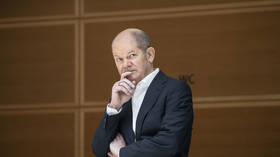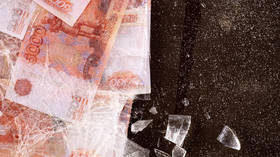Russian money ‘doesn’t belong to anyone’ – Germany’s Scholz

German Chancellor Olaf Scholz has claimed that money generated from Russia’s frozen assets in the EU does not belong to anyone, arguing once again that it can be used by Brussels to purchase weapons for Ukraine.
Speaking to reporters ahead of an EU summit in Brussels on Thursday, Scholz insisted that the bloc needs to boost financial and military support for Kiev and increase ammunition production to keep up with Ukraine’s needs.
He suggested that apart from the funds set aside by member states, additional resources for purchasing weapons for Kiev could come from the “windfall profits” from Russia’s frozen assets.
“We are talking about proceeds that can be used because they do not belong to anyone and therefore can be used by the European Union,” he said, adding that these funds must be used with a “clear direction,” such as procuring ammunition for Ukraine.
Following the launch of Russia’s military operation against Ukraine in February 2022, the EU and other G7 nations froze over $300 billion worth of Russian foreign exchange reserves, with around $200 billion being held in the EU.
In recent months, EU officials have begun discussing either completely seizing these funds and spending them on military support for Ukraine, or at least using the interest generated by the assets.
Initially, Brussels considered only using the windfall income to support the reconstruction of Ukraine after the end of the conflict. However, in light of Kiev’s difficult situation on the battlefield in recent months, EU officials, including the bloc’s top diplomat, Josep Borrell, have insisted on using Russia’s money for military support.
Earlier this week, Borrell proposed allocating 90% of the income from the funds to procure shells for Kiev and using the remaining 10% to support Kiev’s defense industry.
On Thursday, Scholz said he believes there is “broad unity” on the issue within the EU. However, according to a DW report earlier this week, the proposal could be blocked by Hungary. Unlike many of its EU peers, Budapest has not been blindly supportive of Ukraine in the conflict, refusing to send weapons to Kiev and opposing certain economic sanctions on Russia.
Moscow has warned that any actions taken against its assets would amount to theft. It has stressed that seizing the funds or any similar move would violate international law and undermine Western currencies, the global financial system, and the world economy.













